Chemistry polyatomic ions - Study guides, Class notes & Summaries
Looking for the best study guides, study notes and summaries about Chemistry polyatomic ions? On this page you'll find 172 study documents about Chemistry polyatomic ions.
Page 4 out of 172 results
Sort by
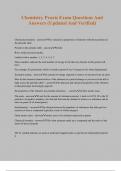
-
Chemistry Praxis Exam Questions And Answers (Updated And Verified)
- Exam (elaborations) • 7 pages • 2024
-
- $11.49
- + learn more
Chemistry Praxis Exam Questions And Answers (Updated And Verified) Chemical periodicity - answerThe variation in properties of elements with their positions in the periodic table Periods in the periodic table - answerPeriods: Rows which run horizontally. Labeled with a number: 1, 2, 3, 4, 5, 6, 7. These numbers indicate the total number of energy levels that any element in this period will have. For example, K (potassium) which is found in period 4, has 4 energy levels when diagrammed. ...

-
Honors Chemistry - Polyatomic Ions Exam Study Guide
- Exam (elaborations) • 3 pages • 2024
- Available in package deal
-
- $9.99
- + learn more
Honors Chemistry - Polyatomic Ions Exam Study Guide
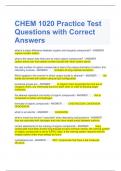
-
CHEM 1020 Practice Test Questions with Correct Answers
- Exam (elaborations) • 12 pages • 2024
-
Available in package deal
-
- $12.99
- + learn more
CHEM 1020 Practice Test Questions with Correct Answers what is a major difference between organic and inorganic compounds? - ANSWER organic contain carbon what is the reason why there are so many organic compounds? - ANSWER carbon atoms can form stable covalent bonds with other carbon atoms the vast number of organic compounds is due to the unique chemistry of carbon. this chemistry involves - ANSWER formation of long chains& isomerism Which applies to the manner in which carbon bonds...
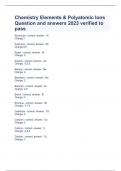
-
Package Deal of POLYATOMIC IONS Question and answers 2023
- Package deal • 5 items • 2023
-
- $25.49
- + learn more
Exam (elaborations) Chemistry Elements & Polyatomic Ions Question and answers 2023 verified to pass Exam (elaborations) polyatomic ions nomenclature Question and answers already passed 2023 Exam (elaborations) Common Polyatomic Ions Question and answers 100% correct 2023 Exam (elaborations) POLYATOMIC IONS Question and answers rated A+ 2023

-
CHEM 1020 FINAL EXAM STUDY GUIDE 184 QUESTIONS WITH COMPLETE SOLUTIONS
- Exam (elaborations) • 12 pages • 2023
- Available in package deal
-
- $10.99
- + learn more
what is a major difference between organic and inorganic compounds? - Correct Answer organic contain carbon what is the reason why there are so many organic compounds? - Correct Answer carbon atoms can form stable covalent bonds with other carbon atoms the vast number of organic compounds is due to the unique chemistry of carbon. this chemistry involves - Correct Answer formation of long chains& isomerism Which applies to the manner in which carbon bonds in alkanes? - Correct Answer the...

-
TEAS 7 Chemistry test 2 Final Exam 2024 study guide
- Exam (elaborations) • 2 pages • 2024
- Available in package deal
-
- $14.49
- + learn more
TEAS 7 Chemistry test 2 Final Exam 2024 study guide 1. Polyatomic atoms ions that contain more than 1 or 2 elements in the atom. usually the elements name of polyatomic atoms end in ate or ite with the exception of hydroxide and cyanide.
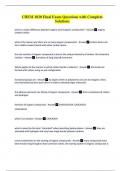
-
CHEM 1020 Final Exam Questions with Complete Solutions
- Exam (elaborations) • 16 pages • 2023
-
- $10.49
- + learn more
CHEM 1020 Final Exam Questions with Complete Solutions what is a major difference between organic and inorganic compounds? - Answer organic contain carbon what is the reason why there are so many organic compounds? - Answer carbon atoms can form stable covalent bonds with other carbon atoms the vast number of organic compounds is due to the unique chemistry of carbon. this chemistry involves - Answer formation of long chains& isomerism Which applies to the manner in which carbon bond...

-
CHEM 1020 FINAL EXAM STUDY GUIDE 184 QUESTIONS WITH COMPLETE SOLUTIONS
- Exam (elaborations) • 21 pages • 2023
-
- $10.99
- + learn more
CHEM 1020 FINAL EXAM STUDY GUIDE 184 QUESTIONS WITH COMPLETE SOLUTIONS what is a major difference between organic and inorganic compounds? -Correct Answer organic contain carbon what is the reason why there are so many organic compounds? -Correct Answer carbon atoms can form stable covalent bonds with other carbon atoms the vast number of organic compounds is due to the unique chemistry of carbon. this chemistry involves -Correct Answer formation of long chains& isomerism Which applies...
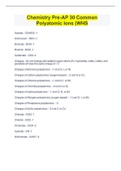
-
Chemistry Pre-AP 30 Common Polyatomic Ions (WHS
- Exam (elaborations) • 3 pages • 2023
-
- $10.49
- + learn more
Acetate - C2H3O2 -1 Ammonium - NH4 +1 Bromate - BrO3 -1 Bromite - BrO2 -1 Carbonate - CO3 -2 Charges - Do not change with added oxygen atoms (Ex: hypoiodite, iodite, iodate, and periodate all have the same charge of -1) Charges of Bromine polyatomics - -1 (not Cl, I, or N) Charges of Carbon polyatomics (oxygen-based) - -2 (not S or Cr) Charges of Chlorine polyatomics - -1 (not N, I, or Br) Charges of Chromite polyatomics - -2 (not C or S) Charges of Iodine polyatomics - -1 (not Cl, N...
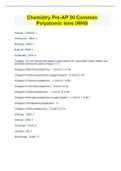
-
Chemistry Pre-AP 30 Common Polyatomic Ions (WHS
- Exam (elaborations) • 3 pages • 2023
-
- $11.49
- + learn more
Acetate - C2H3O2 -1 Ammonium - NH4 +1 Bromate - BrO3 -1 Bromite - BrO2 -1 Carbonate - CO3 -2 Charges - Do not change with added oxygen atoms (Ex: hypoiodite, iodite, iodate, and periodate all have the same charge of -1) Charges of Bromine polyatomics - -1 (not Cl, I, or N) Charges of Carbon polyatomics (oxygen-based) - -2 (not S or Cr) Charges of Chlorine polyatomics - -1 (not N, I, or Br) Charges of Chromite polyatomics - -2 (not C or S) Charges of Iodine polyatomics - -1 (not Cl, N...

Do you wonder why so many students wear nice clothes, have money to spare and enjoy tons of free time? Well, they sell on Stuvia! Imagine your study notes being downloaded a dozen times for $15 each. Every. Single. Day. Discover all about earning on Stuvia


